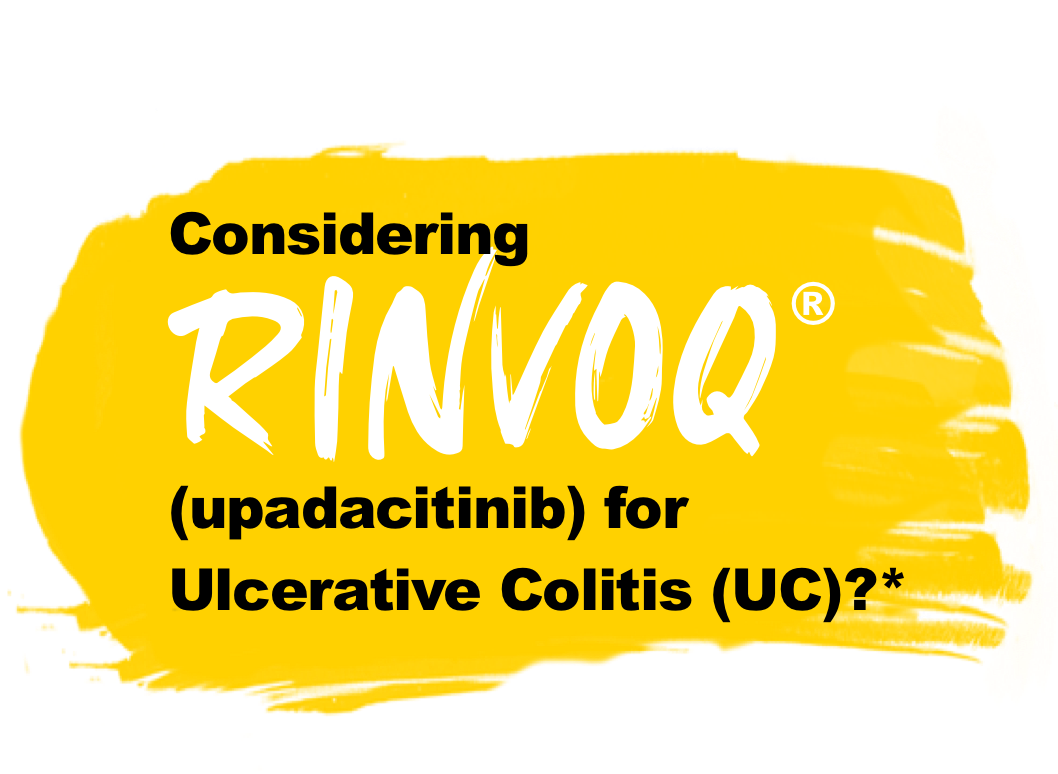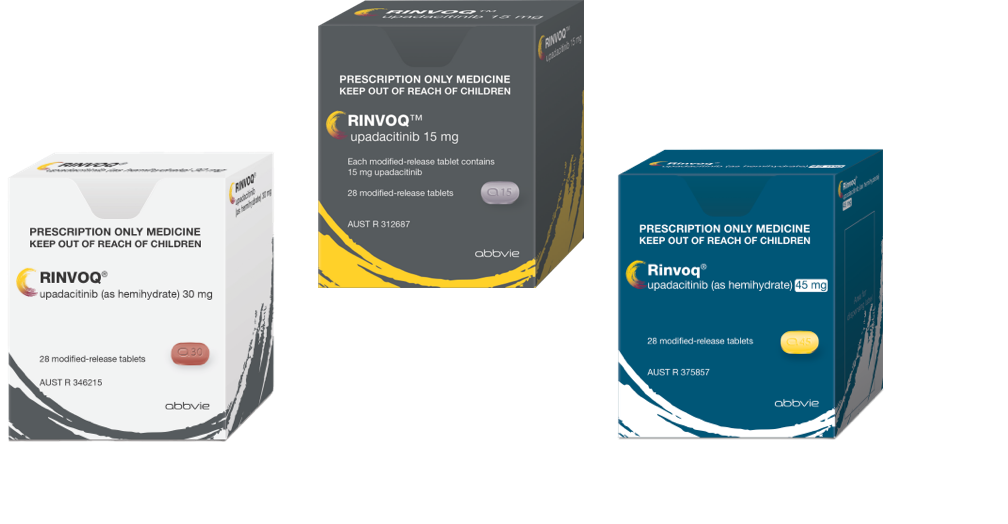
Consider RINVOQ® for Ulcerative Colitis
*RINVOQ® is indicated for the treatment of adult patients with moderate to severe active ulcerative colitis, who have had an inadequate response, loss of response or intolerance to either conventional or biologic agent.1
If you are still experiencing UC symptoms with your current treatment, there may be uncontrolled inflammation in the intestines that can lead to colon lining damage.2
With just one tablet daily, RINVOQ® may help.1,3
Not all medicines are for all patients. Speak to your doctor and see the safety information here for more details.
A once-daily pill for moderate to severe UC1,3
Living with a chronic inflammatory bowel disease such as UC can be stressful and isolating, especially if your symptoms are severe and unpredictable.2 It is a disease that can affect your whole body and every aspect of your life, from being able to meet a friend for lunch to feeling comfortable at work.
RINVOQ® is a once-daily tablet used to treat different inflammatory conditions, including adults with moderate to severe active UC.1,3

How can RINVOQ® help me?1,3
Before now, you may have received other medicines for your UC. However, you may not have responded adequately to them. Therefore, your doctor may decide to prescribe RINVOQ® for your condition.
RINVOQ® works by targeting a specific source of inflammation that contributes to your intestinal symptoms (Janus kinase). By reducing the activity of Janus kinase, RINVOQ® can help to improve:
- Abdominal pain
- The need to rush to the toilet (bowel urgency)
- The number of times you go to the toilet (bowel frequency)
- Fatigue
The efficacy and safety of RINVOQ® in moderately to severely active ulcerative colitis patients were evaluated in three multicentre, double-blind, placebo-controlled Phase 3 clinical studies consisting of two replicate induction studies involving 988 patients (UC1 and UC2) and a maintenance study involving 451 patients (UC3).1,4
Collectively, these trials supported that, compared to placebo, a greater percentage of patients who received RINVOQ® achieved disease remission at 8 weeks and 1 year, with relief from UC symptoms† seen as early as 2 weeks and no bowel urgency or abdominal pain at 8 weeks.‡1,4
†based on the frequency of bowel movements and the amount of bloody stools.4
‡474 patients were randomly assigned to RINVOQ® 45 mg once daily (n=319) or placebo (n=155) in UC1. 522 patients were randomly assigned to RINVOQ® 45 mg once daily (n=345) or placebo (n=177) in UC2. In UC3, a total of 451 patients (21 from the phase 2b study, 278 from UC1, and 152 from UC2) who achieved a clinical response after 8 weeks of RINVOQ® induction treatment were randomly assigned again to RINVOQ® 15 mg (n=148), RINVOQ® 30 mg (n=154), and placebo (n=149) in the primary analysis population. All enrolled patients had moderately to severely active ulcerative colitis defined as an adapted Mayo score (aMS) of 5 to 9 with a centrally reviewed endoscopy subscore (ES) of 2 or 3 and demonstrated prior treatment failure, including inadequate response, loss of response, or intolerance to prior conventional and/or biologic treatment. In the induction studies, patients were randomised to RINVOQ® 45 mg once daily or placebo for 8 weeks. For patients with baseline corticosteroid treatment, clinical remission at Week 8 was achieved in 26.5% of patients treated with RINVOQ® 45 mg once daily and 4.0% with placebo, and for patients without baseline corticosteroid treatment, the rates were 31.9% of patients treated with RINVOQ® 45 mg once daily and 4.7% with placebo. Onset of efficacy was rapid, with a greater proportion of patients treated with RINVOQ® 45 mg once daily achieving clinical response as early as Week 2 compared to placebo. A significantly greater proportion of patients treated with RINVOQ® 45 mg once daily compared to placebo had no abdominal pain or bowel urgency at Week 8. The efficacy analysis for the maintenance study evaluated 451 patients who achieved clinical response per aMS with 8-week RINVOQ® 45 mg once daily induction treatment. Patients were randomised to receive RINVOQ® 15 mg, 30 mg, or placebo once daily for up to 52 weeks. Clinical remission, defined as a partial Mayo score (consisting of stool frequency subscore (SFS), rectal bleeding subscore (RBS), and Physician global assessments (PGA)) ≤ 2 with no subscore >1, was achieved over time through Week 52 in more patients treated with both RINVOQ® 15 mg and 30 mg once daily compared with placebo.1,4
RINVOQ® Dosing for UC1,3
To Start
The recommended starting dose for RINVOQ® is 45 mg once daily for 8 weeks.§
§The Inducton phase may be extended for up to 16 weeks as needed to reduce your disease activity. Your doctor will determine how long your induction phase should be at your follow-up visit.
Maintenance Dose
After 8 weeks, the recommended maintenance dose is 15 mg. In certain cases, your doctor may consider a maintenance dose of 30 mg instead.
Your doctor will prescribe the dose that’s right for you: speak to your doctor and see the safety information here for details on the special dosing considerations with RINVOQ®.
RINVOQ® can be taken with or without food. Avoid food or drink containing grapefruit. Do not split, crush, or chew the pill.
Inflammatory conditions are chronic conditions, so to help control your symptoms, RINVOQ® should be taken exactly as prescribed by your doctor.

RINVOQ® for Ulcerative Colitis in New Zealand
RINVOQ® is only available with a prescription, so if you are still experiencing symptoms of UC despite your current treatment, consult your gastroenterologist to see if RINVOQ® is right for you.
RINVOQ® is not funded for ulcerative colitis, and you will need to pay the full cost of this medicine if prescribed for these conditions. Usual doctor's consultation fees and pharmacy prescription charges will be payable by you.